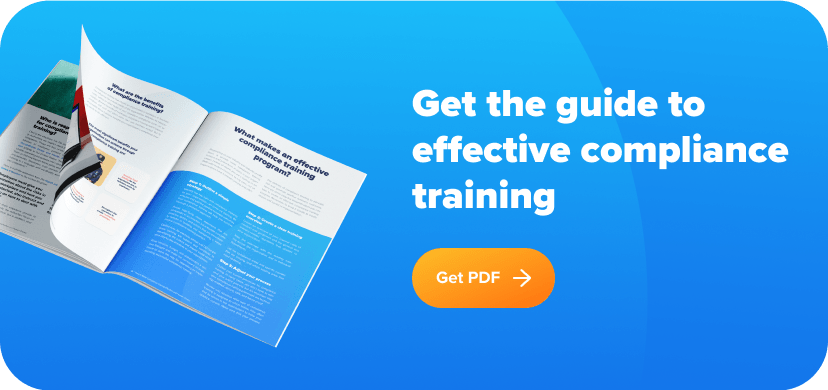Why it matters: Without proper training, your company could violate key Illinois and Chicago employment laws, facing harsh penalties and lawsuits.
These topics can get dense and confusing. We’ll keep it brief and tell you exactly what you need to know. For more information, check out our trainings on each of these topics, which dive deep into the details of each law, and how to keep your company compliant.
Illinois Sexual Harassment Training
As of 2019, Illinois employers are required to provide sexual harassment training. The Workplace Transparency Act requires employers with one or more employees to provide sexual harassment training as outlined and prohibited by the Illinois Human Rights Act. Every employee and interns must be trained.
Companies are required to train employees but also provide a second training to supervisors. Training must happen within six months of the first day of a new employee. Employers must also train employees at least once per year.
Under this Illinois law, employers must train employees on:
- The definition and a full explanation of workplace sexual harassment
- Examples of unlawful sexual harassment
- A summary of federal and Illinois laws covering sexual harassment and the remedies for victims
- What employers must do when an employee files a complaint
To address that last bullet point further, employers must conduct an investigation in a timely manner. If issues are found, they must be corrected immediately. Companies must also take proactive steps to prevent sexual harassment at work.
All Illinois employers subject to this training requirement must keep records of all training given to employees. These records may include a signed employee acknowledgment, a course sign-in sheet, or a certificate of completion. Electronic records will satisfy this requirement.
Failure to comply with the training requirements of this Illinois law could result in penalties of up to $1000 per violation. Subsequent violations could see penalties as high as $5000 per violation.
Special Training Requirements for Restaurants and Bars
Besides the sexual harassment training requirements for all Illinois employers, restaurants and bars must provide additional training. This training must be tailored to the prevention of sexual harassment in these establishments.
Sexual harassment training must comply with the above requirements, and:
- Must include specific conduct, activities, or videos related to the restaurant or bar industry
- A full and detailed explanation of manager or supervisor liability and responsibility
- Training must be offered in both English and Spanish
Chicago Training Requirements
Beyond the stated requirements, Chicago has additional training requirements for employers in the city. Chicago requires all employers with at least one employee to provide:.
Sexual harassment training must comply with the above requirements, and:
- One hour of sexual harassment prevention training to all employees, plus one additional hour for all managers and supervisors
- One hour of bystander training for all employees
These trainings must be provided to all employees at least annually, so it’s worth investing in a learning management system that can help you manage, automate and track recurring compliance reports.

Illinois Minimum Wage
The current minimum wage in Illinois is $13. For tipped employees, the minimum wage is $4.95 per hour. If a tipped worker does not receive enough tips to make their average minimum wage at least $12 per hour, the employer must make up the difference.
The Illinois minimum wage is also scheduled to rise each year as follows:
- January 1, 2024: $14
- January 1, 2025: $15
Chicago has a higher minimum wage than the state. For employers with up to 20 employees, the minimum wage is $14.50 per hour. For tipped workers of companies with up to 20 employees, they must be paid $8.70 per hour. Employers with more than 20 employees must pay $15.40 per hour and must pay tipped workers $9.24 per hour.
Cook County also has a higher minimum wage than the state. It’s $13.35 per hour, or $7.40 per hour for tipped employees.
Illinois Equal Pay Protection
The Illinois Equal Pay Act prohibits employers from paying lower wages if they’re a member of a protected class. Employees must be in comparable roles, performing the same or substantially similar duties.
Companies may differentiate pay based on nondiscriminatory reasons. Employees in the same position may be paid differently because of their experience, their tenure, the company’s merit increase system, or any other legitimate business reason. The difference in pay must be directly related to the job.
This law also prohibits employers from terminating employees who discuss their wages. Companies cannot require employees to sign a contract or document prohibiting them from disclosing their wages, benefits, or any compensation information. Employees have this right in Illinois and their employer cannot prevent such discussion.
The Equal Pay Act also limits an employer’s ability to discuss a candidate’s prior salary. The law prohibits employers from:
- Screening job applicants based on their wage history
- Requiring applicants to provide prior salary history as a condition of employment, promotion, or interview
- Using known salary history of an employee to determine future earnings or other compensation

Illinois Freedom to Work Act
The Illinois Freedom to Work Act applies directly to non-compete agreements and non-solicitation agreements. Only agreements signed after January 1, 2022 fall under this law and amendments.
Non-compete agreements are documents restricting an employee from:
Performing similar work for other employers within a certain period of time after separation from their existing employer
- Performing work in a specific geographical area
- Non-solicitation agreements restrict employees from:
- Soliciting employment from their employer’s clients or customers
- Soliciting clients or customers of their employer to purchase or contract directly with the employee
To be valid in Illinois, either type of agreement must:
- Be no more restrictive than is reasonably required to protect the legitimate business interests of the employer
- Not impose an undue hardship on the employee
Employees must also meet certain salary requirements for an employer to restrict them through a non-compete or non-solicitation agreement. For non-compete agreements, employees must be paid at least $75,000 per year. For a non-solicitation agreement, employees must be paid at least $45,000 per year. These salary thresholds are set to increase every five years by $5000 for non-compete agreements and $2500 for non-solicitation agreements. The increases will cease on January 1, 2037.
For either restrictive covenant to be valid and enforceable in Illinois, the employee must have worked for the employer for at least two years after signing the agreement. The employee must also have received consideration adequate to support the signing of an agreement, like professional or financial benefits. All employees must be provided at least 14 days to review the document, make proposed changes, and decide whether to sign.
Ban the Box
The Illinois Job Opportunities for Qualified Applicants Act restricts employers with 15 or more employees from asking about an applicant’s criminal convictions during the hiring process. Companies cannot ask applicants about their criminal history before the interview stage.
Pregnancy Discrimination & Breastfeeding
Under the Illinois Human Rights Act, employers must give pregnant employees reasonable accommodations. This may include more frequent bathroom breaks, assistance with manual labor, and modifications to work duties or schedules. Employers are required to post a notice about these requirements in the workplace.
Labor Law Poster Requirements
The Illinois Department of Labor gives you easy access to every poster requirement. Remember that these posters must be displayed in a conspicuous place at work or provided to all employees in an acceptable electronic format.
Some posters must be posted in multiple languages.
Medical & Recreational Marijuana
As of 2020, Illinois law provides for the recreational use of marijuana. The Illinois Right to Privacy in the Workplace Act prevents employers from terminating employees because they used marijuana on their own time and in a way that does not affect their ability to do their job. Yet, employers may also strive for a drug-free workplace and test employees.
So what happens if an employee tests positive for marijuana?
This is an area of the law that’s still being settled in Illinois. Employers might argue that they can refuse to hire, or terminate, an employee who fails a drug test. But an employee would argue that they can be drug tested, but if marijuana is detected, they cannot be terminated so long as the employee can show they used marijuana in a way that wouldn’t impact their work.
This issue is still being debated so your best course of action right now is to have clear policies and stick to them every time.

Key Takeaways
- Illinois employers are required to provide sexual harassment training to all employees and interns, as well as a separate training for supervisors.
- Restaurants and bars must provide additional sexual harassment prevention training that is specific to the industry.
- Chicago employers are required to provide one hour of sexual harassment prevention training annually to all employees, plus one additional hour for all managers and supervisors, as well as bystander training.
- The Illinois minimum wage is scheduled to rise each year until 2025 when it reaches $15 per hour. In Cook County, the minimum wage is currently $13.35 per hour, and in Chicago, it’s $15.40 for most employers.
- Illinois employers cannot restrict employees in a non-compete agreement unless the employee makes at least $75,000 per year.
Your Next Steps
It’s important to stay compliant with Illinois employment laws, and that means making sure your HR teams are properly trained on the ever-changing regulations. You don’t want to be caught off guard and end up facing a lawsuit.
To help you, partner with a training platform does the hard work for you, so you can focus on your core business needs. With eloomi, we make sure your compliance training is up to date and contains accurate information to help guide and support your employees in their work.
Get in touch to learn more about eloomi LMS or explore our tailored compliance content bundles.







